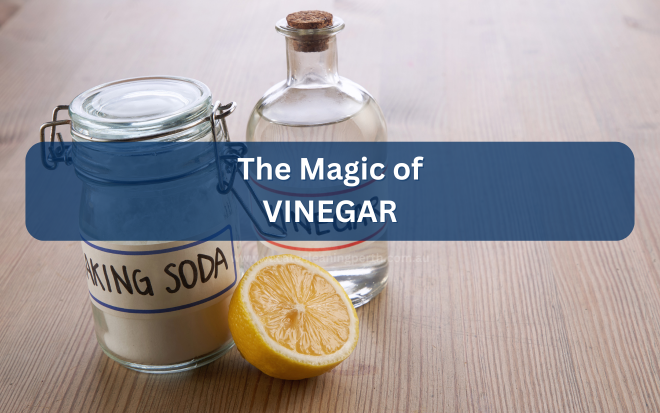When it comes to household cleaning, the solution to many of your toughest chores might already be in your pantry. Vinegar, particularly white distilled vinegar, is a versatile, eco-friendly, and cost-effective cleaning agent that can tackle a multitude of tasks around your home. Let’s explore the magic of vinegar and how you can harness its power for a sparkling clean living space.
Why Vinegar Works Wonders
Vinegar contains acetic acid, which gives it its characteristic tang and potent cleaning properties. This acidity allows vinegar to break down grime, dissolve mineral deposits, and neutralize odors, making it an excellent natural cleaner. Moreover, vinegar is non-toxic and environmentally friendly, making it a safe choice for households, especially those with children and pets.
Top Uses for Vinegar in Home Cleaning
- Glass and Mirror Cleaner
Achieve streak-free windows and mirrors by mixing equal parts of water and white vinegar in a spray bottle. Spray the solution onto the glass surface and wipe clean with a lint-free cloth. This method effectively removes smudges and leaves your glass surfaces gleaming.
- Kitchen Degreaser
Cut through kitchen grease by applying undiluted white vinegar to stovetops, countertops, and backsplashes. Let it sit for a few minutes before wiping clean with a damp cloth. For stubborn grease, a paste made from vinegar and baking soda can provide extra scrubbing power.
- Microwave Cleaner
Loosen food splatters and eliminate odors by placing a microwave-safe bowl filled with equal parts water and vinegar inside the microwave. Heat on high until the mixture boils and the window steams up. Carefully remove the bowl and wipe the interior with a clean cloth.
- Bathroom Freshener
Tackle soap scum and mildew by spraying undiluted vinegar onto shower walls, tubs, and sinks. Allow it to sit for several minutes before scrubbing and rinsing. For toilet cleaning, pour a cup of vinegar into the bowl, let it sit overnight, then scrub and flush for a sparkling finish.
- Floor Cleaner
For tile or vinyl floors, mix 1/2 cup of vinegar with a gallon of warm water. Mop as usual to remove dirt and grime without leaving a sticky residue. However, avoid using vinegar on hardwood floors, as its acidity can damage the finish.
- Laundry Booster
Add 1/2 cup of vinegar to your washing machine’s rinse cycle to soften fabrics, reduce static cling, and eliminate lingering odors. Vinegar also helps to break down detergent residues, leaving your clothes feeling fresh and clean.
Precautions When Cleaning with Vinegar
While vinegar is a powerful natural cleaner, it’s essential to use it appropriately:
- Avoid Natural Stone Surfaces: The acidity of vinegar can etch and damage natural stone surfaces like granite, marble, and limestone. Opt for cleaners specifically designed for these materials.
- Test on Delicate Fabrics: Before using vinegar on delicate fabrics, perform a spot test to ensure it doesn’t cause discoloration.
- Do Not Mix with Bleach: Combining vinegar with bleach can produce toxic chlorine gas. Always use these products separately.
Incorporating vinegar into your cleaning routine offers an effective, natural, and budget-friendly alternative to commercial cleaners. Its versatility makes it a valuable tool for maintaining a clean and healthy home environment. Next time you’re faced with a tough cleaning task, reach for that bottle of vinegar and experience its magic firsthand.

